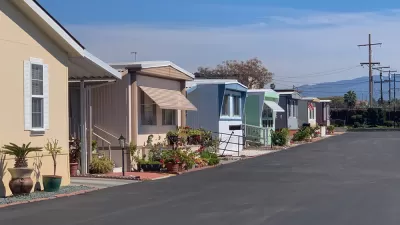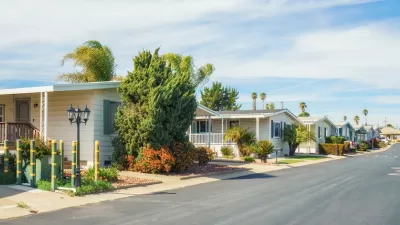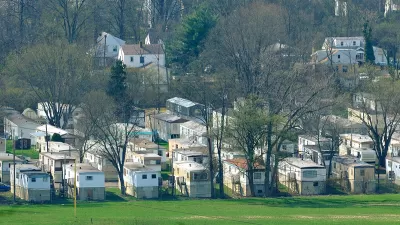With demand surging and rent costs rising sharply, mobile home parks are becoming unaffordable for their most vulnerable residents.

In an article for The Washington Post, Abha Bhattarai highlights growing fears among mobile home residents as rent increases hit mobile home parks around the country. “Surging home prices and rents are cascading down to the country’s mobile home parks, where heightened demand, low supply and an increase in corporate owners is driving up monthly costs for low-income residents with few alternatives.” As we noted in a story last year, “private-equity firms and developers are often circling nearby, looking to buy up such properties and turn them into more lucrative ventures, including timeshare resorts, wedding venues and condominiums.”
With roughly 20 million Americans living in manufactured homes, rising costs for this historically affordable housing option are putting some of the country’s lowest-income households in peril of losing their homes. Although many mobile home residents own their trailer, rising land rents, the cost of moving a mobile home, and a lack of regulations on mobile home rent in most cities put mobile home owners in a precarious position.
“The circumstances surrounding mobile homeownership are yet another way the housing market has worsened long-standing inequities,” Bhattarai writes. “While homeowners enjoyed cheaper mortgages during the pandemic, loans for buying manufactured homes often come with higher interest rates, limited opportunities to refinance and fewer protections than those for typical mortgages, according to a Consumer Financial Protection Bureau report.”
FULL STORY: ‘We’re all afraid’: Massive rent increases hit mobile homes

Manufactured Crisis: Losing the Nation’s Largest Source of Unsubsidized Affordable Housing
Manufactured housing communities have long been an affordable housing option for millions of people living in the U.S., but that affordability is disappearing rapidly. How did we get here?

Americans May Be Stuck — But Why?
Americans are moving a lot less than they once did, and that is a problem. While Yoni Applebaum, in his highly-publicized article Stuck, gets the reasons badly wrong, it's still important to ask: why are we moving so much less than before?

Research Shows More Roads = More Driving
A national study shows, once again, that increasing road supply induces additional vehicle travel, particularly over the long run.

Judge Halts Enforcement of Anti-Homeless Laws in Grants Pass
The Oregon city will be barred from enforcing two ordinances that prosecute unhoused residents until it increases capacity and accessibility at designated camping sites.

Advancing Sustainability in Los Angeles County Schools
The Los Angeles County Office of Education’s Green Schools Symposium brings together educators, students, and experts to advance sustainability in schools through innovative design, climate resilience strategies, and collaborative learning.

Using Old Oil and Gas Wells for Green Energy Storage
Penn State researchers have found that repurposing abandoned oil and gas wells for geothermal-assisted compressed-air energy storage can boost efficiency, reduce environmental risks, and support clean energy and job transitions.
Urban Design for Planners 1: Software Tools
This six-course series explores essential urban design concepts using open source software and equips planners with the tools they need to participate fully in the urban design process.
Planning for Universal Design
Learn the tools for implementing Universal Design in planning regulations.
City of Moreno Valley
Institute for Housing and Urban Development Studies (IHS)
City of Grandview
Harvard GSD Executive Education
NYU Wagner Graduate School of Public Service
City of Cambridge, Maryland
Newport County Development Council: Connect Greater Newport





























